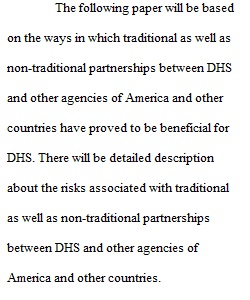


Q Instructions Assignment 2 Homeland Security Partnership Engagement The greatest change in corporate culture-and the way business is being conducted-may be the accelerated growth of relationships based… on partnership.—Peter Drucker Background: The Office of Partnership and Engagement (OPE) coordinates DHS outreach efforts with critical stakeholders nationwide, including state, local, tribal, territorial (SLTT) governments, SLTT elected officials, SLTT law enforcement, the private sector, and colleges and universities. The DHS Science and Technology Directorate (S&T) engages industry partners and facilitates partnerships with private sector innovators to advance commercial technology solutions that address homeland security challenges. The DHS Office of Policy coordinates conducts activities with international partners around the world in the areas of counterterrorism and terrorism prevention, law enforcement, information sharing, aviation security, customs regulation and border security operations, cybersecurity, countering violent extremism, humanitarian support related to mass migration, human trafficking, and emergency response. Fusion Centers, Regional Information Sharing System (RISS) Centers, Emergency Operations Centers and Joint Terrorism Task Forces have an important responsibility to build strong partnerships with other field-based law enforcement and homeland security entities at all levels of government. Assignment: Traditional and non-traditional partnerships have become the norm in the private and public sectors. Intelligence is only as good as its sources, and sources are only as good as their access. Discuss the value of DHS in working with high-valued partnerships and the risk of poorly aligned partnerships. Include: • Describe how collaboration and strategic partnerships are fundamental to benefiting homeland security such as information access, improved collection, innovative technology, greater regional and cultural knowledge, etc. Support with real-world examples. • Discuss the risks such as security, insider threats, inequities in exchange, loss of operational control, legal implications, etc. • Make recommendations on improving and expanding partnerships that can lead to bigger and more innovative opportunities. Requirements: Your paper should be at least 8-10 pages double-spaced, not including the cover page, introduction, and references. • The paper must cite at least one (1) academic or professional reference for each page written, located through the UMGC library. • Resources must be properly cited within the body of the text and reflected in the references using APA 7th edition format and citation rules. • Stay focused on your task. Use course materials, carefully cite your information, and ensure that the paper is plausible. • Be concise. Longer papers do not fare better if they contain irrelevant material. • Inform the reader. As with most Intelligence writing, shorter and focused is best. • This assignment is due at the end of week 5, NLT at 11:59 p.m. ET. Good luck and let me know if you have any questions.
View Related Questions